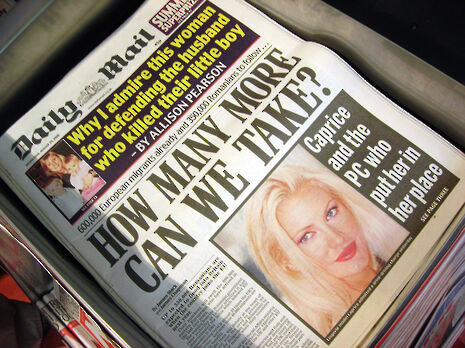Tabloid press: The last laugh is on you
The manipulative power of tabloid journalism is not restricted to gospel or outrage, argues Sarah Sheard

Before I go any further, I have to admit three things. Firstly, I have read the Guardian religiously since I was in my early teens; secondly, I could be described as politically left-of-centre; thirdly, there are no copies of the Mail and tabloid papers allowed in my house.
So far, I have just about fulfilled the stereotype of the tabloid-hater which features in Isobel Cockerell’s recent article for the Stepford Student, in which she details the “confessions of a tabloid journalist”. The fact that I have written and edited for Varsity since my first year in Cambridge is probably the cherry on top of the caricature.
But this is the end of the things that could be broadly described as correct about this article, and its assertion that the stereotypical tabloid-hater is “misguided” for refusing to read the output of Murdoch et al, citing their “great, undeniable power,” is one of the more glaring errors.
I for one, along with any other coherent person, would not deny that the tabloid press can make and break a politician, or build up and tear down a celebrity; the Sun, the Daily Mail and the Daily Mirror are the top three newspapers in the UK by circulation.
And yet, even with the indisputable assertion that tabloid journalism has a huge influence over the population’s thoughts, opinions and beliefs, the article asks us to see tabloids as “a lucrative and elaborate joke; an abstract concept; almost an art form”.
Tabloid journalism as a tongue-in-cheek satire just does not sit comfortably with the reality of its influence over people from all walks of life, who then have influence over the world around them. Tabloids are a joke that we’re not all in on, as the article even admits when it points out that “tabloids are either gospel or outrage”.
Fair enough (albeit somewhat narcissistic) to write clickbait purely for the seething attention, but it’s notable that the former is pretty much omitted. Cockerell says nothing of what happens when the hyperbolically unreasonable views are taken seriously by those who religiously read tabloids, i.e. a large percentage of the population.
The piece neatly skirts around the main reason why people, like myself, refuse to buy tabloids, which is that the joke is lost on many readers. It dissolves into a chasm of unethical practice, bigotry and a complete absence of compassion. And when that happens, a lot of unfunny things occur, whilst the tabloid journalists count their coins and carry on.
To name just one example of this, I could mention the article published in the Daily Mail in 2012 about schoolteacher Lucy Meadows returning to work after transitioning. The article referred to her using male pronouns, featured pre-transition photographs, and perpetuated deeply transphobic views. It was shortly followed by Meadows’ suicide. At the inquiry into her death, the coroner ruled that the Mail had “sought to ridicule and humiliate Lucy Meadows”, calling it “ill-informed bigotry”.
The hounding of Lucy Meadows, who had done nothing wrong except transition, only breathed life into transphobia and bigotry amongst those who read the article without realising the humour of belittling and humiliating a trans woman. Because banter, right?
Tabloids often lack any ethical basis whatsoever for how they obtain the information for this grand joke. I could mention the infamous phone hacking scandal, only fully brought to light in 2011, in which countless phones were illegally hacked by scandal-hungry journalists.
The murdered schoolgirl Milly Dowler had her voicemail hacked by an investigator working for the News of the World following her disappearance. The automatic deletion of messages after the investigator had listened to them gave false hope to her family that she was still alive – at least for the six months until her body was found.
I could mention the fact that the Sun is still widely boycotted in my hometown of Liverpool after it published an entirely fabricated report just four days after 96 people were killed and almost 800 were injured in the Hillsborough disaster of 1989. The Sun alleged that fans had picked the pockets of corpses, urinated on police and beaten up a policeman attempting CPR. This was, in the simplest terms, sensationalist libel which smeared the memory of innocent victims, their families, and Liverpool as a city.
And there, in just three simple vignettes, you have the full scale of what happens when the joke turns sour in tabloid culture, when satire transgresses into something more sinister. I have no doubt that the power is “delicious”, as Cockerell describes it, but tabloid culture as an elaborate satire with no real consequences? I’m not buying it. I doubt that the 96, Milly Dowler’s family, or Lucy Meadows would buy it either.
The article in the Stepford Student concludes by apologising to anyone who has been “had” by tabloid journalism, explaining that “it was just too easy”. In this it is at least above the editor of the Sun in 1989, Kelvin MacKenzie. He apologised at the end of the full inquiry into the Hillsborough disaster, which was finally held in 2012 and called out the tabloid greed which had fuelled the demonisation of innocent Liverpool fans.
But he had apologised once before, in 2004 – even then 15 years too late – before retracting his apology just two years later, stating “I was not sorry then and I’m not sorry now”. Well, I suppose he was too busy laughing all the way to the bank.
 Comment / The (Dys)functions of student politics at Cambridge19 January 2026
Comment / The (Dys)functions of student politics at Cambridge19 January 2026 News / Local business in trademark battle with Uni over use of ‘Cambridge’17 January 2026
News / Local business in trademark battle with Uni over use of ‘Cambridge’17 January 2026 News / Your Party protesters rally against US action in Venezuela19 January 2026
News / Your Party protesters rally against US action in Venezuela19 January 2026 Features / Exploring Cambridge’s past, present, and future18 January 2026
Features / Exploring Cambridge’s past, present, and future18 January 2026 News / Cambridge bus strikes continue into new year16 January 2026
News / Cambridge bus strikes continue into new year16 January 2026







